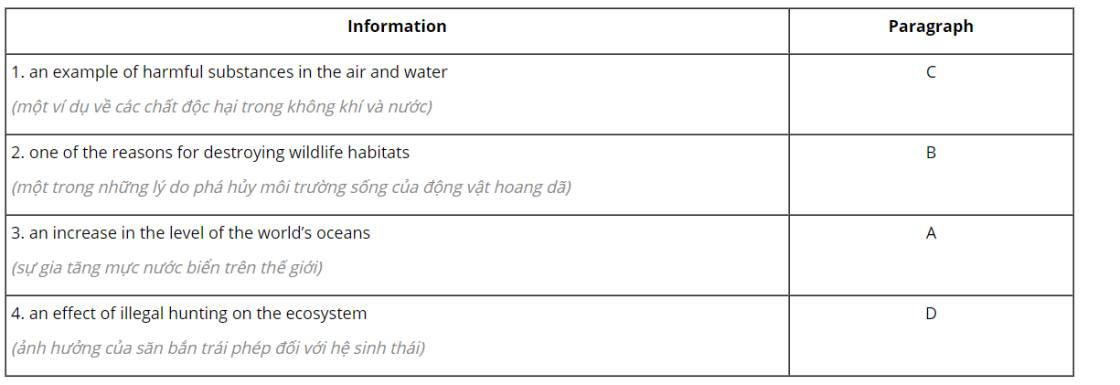Hãy nhập câu hỏi của bạn vào đây, nếu là tài khoản VIP, bạn sẽ được ưu tiên trả lời.

1. Speak with words and language humans
(Nói bằng từ và ngôn ngữ) (con người)
Thông tin:
We send messages with body language, we greet friends with touch and we speak using words to show our emotions and ideas.
(Chúng ta gửi đi những thông điệp bằng ngôn ngữ cơ thể, chúng ta chào đón bạn bè qua việc động chạm và chúng ta nói bằng cách sử dụng từ ngữ để thể hiện cảm xúc và ý tưởng của bản thân.)
2. Spread ears to show anger or aggression elephants
(Xòe tai để thể hiện sự tức giận hoặc hung hăng) (voi)
Thông tin:
For example, elephants spread their ears to show anger.
(Ví dụ, voi xòe tai để thể hiện sự tức giận.)
3. Shake their head to disagree humans
(Lắc đầu thể hiện sự không đồng ý) (con người)
Thông tin:
And while humans shake their heads to disagree elephants do this to show they are happy.
(Và trong khi con người lắc đầu tỏ vẻ không đồng ý thì voi làm điều này để thể hiện chúng đang hạnh phúc.)
4. Shake their head to show they are happy elephants
(Lắc đầu để thể hiện chúng đang hạnh phúc) (voi)
Thông tin:
And while humans shake their heads to disagree elephants do this to show they are happy.
(Và trong khi con người lắc đầu tỏ vẻ không đồng ý thì voi làm điều này để thể hiện chúng đang hạnh phúc.)
5. Touch each other to show their feelings both
(Chạm vào nhau để thể hiện tình cảm) (cả hai)
Thông tin:
As with humans, touch is also very important between elephants.
(Như con người, việc động chạm cũng rất quan trọng giữa các con voi.)
6. Laugh humans
(Cười) (con người)
Thông tin:
Even if they can’t laugh like a human, elephants have a great sense of humor.
(Ngay cả khi chúng không thể cười như con người, voi có một khiếu hài hước tuyệt vời.)
7. Have a sense of humor both
(Có khiếu hài hước) (cả hai)
Thông tin:
Even if they can’t laugh like a human, elephants have a great sense of humor.
(Ngay cả khi chúng không thể cười như con người, voi có một khiếu hài hước tuyệt vời.)
8. Copy sounds they hear both
(Sao chép âm thanh nghe được) (cả hai)
Thông tin:
Like humans, they can also copy sounds and make their own sounds that seem to communicate basic human words and phrases like, “Hello,” “I love you,” and “Let's go.”
(Giống như con người, chúng cũng có thể sao chép âm thanh và tạo ra âm thanh của riêng mình dường như để giao tiếp các từ và cụm từ cơ bản của con người như, “Xin chào”, “Tôi yêu bạn” và “Đi thôi.”)

She …………..(not study) English very well
* Answer :
=> doesn't study
=> Vì sau Trợ động từ " doesn't " thì Động từ ko được chia

Mai hates eating fast food because it’s not good ……her health.
a. on b. for c. at d. in
2. If you want to live long, you …… eat much red meat.
a. should b. needn’t c. have to d. shouldn’t
3. Don’t read in bed, ................ you’ll harm your eyes.
a. or b. and c. but d. so
4. When you are in the swimming pool, play _______and listen to the pool lifeguard_______
A. safe / careful B. safely / careful
C. Safe/ carefully D. safely / carefully
5. These are their books and those are_______
A. we B. our C. ours D. us
6. How _______ is it from Hanoi to Hue City ?
A. many B. long C. far D. much
7. Could you show me the way ______ the railway station please ?
A. to B. at C. next D. from
8. The boy is better _________English than I am.
A. for B. with C. in D. at
9. He looks different _________his father.
A. at B. with C. on D. from
10. _________novels are very interesting.
A. These B. This C. That D. It
II/ Choose the best answer.
Mai hates eating fast food because it’s not good ……her health.
a. on b. for c. at d. in
If you want to live long, you …… eat much red meat.
a. should b. needn’t c. have to d. shouldn’t
Don’t read in bed, ................ you’ll harm your eyes.
a. or b. and c. but d. so
4. When you are in the swimming pool, play _______and listen to the pool lifeguard_______
A. safe / careful B. safely / careful
C. Safe/ carefully D. safely / carefully
5. These are their books and those are_______
A. we B. our C. ours D. us
6. How _______ is it from Hanoi to Hue City ?
A. many B. long C. far D. much
7. Could you show me the way ______ the railway station please ?
A. to B. at C. next D. from
8. The boy is better _________English than I am.
A. for B. with C. in D. at
9. He looks different _________his father.
A. at B. with C. on D. from
10. _________novels are very interesting.
A. These B. This C. That D. It
